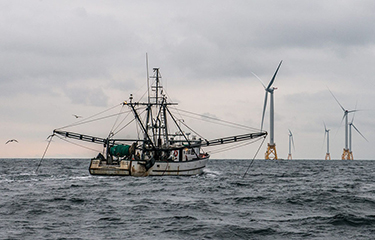A nationwide coalition of U.S. commercial fishing groups is asking Congress for nearly USD 74 million (EUR 69 million) in federal spending to survey and plan for how offshore wind energy development may change marine environments and fishing communities.
An accelerated drive to develop ocean wind power in the U.S. has so far led to 28 wind lease areas in federal waters, two projects now underway off southern New England, and nearly 55 million acres on all coasts in consideration for possible development.
“The enormous size of these areas and their direct overlap with key grounds for seafood production and protected resource conservation underscore the critical need for funding to address the impacts of this burgeoning industry,” the Seafood Harvesters of America and Responsible Offshore Development Alliance wrote in a 21 June letter to congressional leaders on behalf of 75 fishing associations and businesses.
The letter notes the nearly USD 45 million (EUR 42 million) the administration of U.S. President Joe Biden has budgeted in fiscal-year 2022 for the National Marine Fisheries Service to conduct various studies related to offshore wind.
But an additional USD 43.75 million (EUR 41.3 million) is now needed just to assure that NMFS annual scientific surveys – the keystone for monitoring fisheries resources – can be continued while working around wind turbine projects, the letter states. That would be a 250 percent increase over what has been allocated.
“The scale of [offshore wind] proposed in the U.S. is staggering,” the letter states. “Other federal agencies have received billions of dollars to support OSW permitting and transmission needs; We feel the development of appropriate environmental impact mitigation strategies are equally important, if not more so.”
The push for energy development at sea threatens to disrupt decades of scientific work that has made U.S. ocean and fisheries public policy globally respected, the advocates said.
“Fisheries data collection, surveys, and assessments are crucial to our understanding of our ocean and fishery resources. Specifically, the data collected through annual federal scientific surveys is an integral piece of the stock assessment and catch limit setting process, foundational pillars of our nation’s sustainable fisheries management,” the letter says. “NMFS currently conducts more than 50 such long-term standardized surveys, many of which have been ongoing for more than 30 years. These surveys provide a long-term time series data set, essentially a time lapse of the status of fish stocks; their scientific value lies in their consistency over time.”
Those longtime survey procedures and patterns will unavoidably need to change as wind turbine arrays occupy offshore lease areas, NMFS officials have said. The resulting effects on statistical design, habitat changes, and loss of sampling efficiency must be accounted for.
“This mitigation work is a significant undertaking for a single scientific survey and yet we are now looking at no fewer than 25 known surveys across the Atlantic and Pacific coasts that will be disrupted by OSW,” the letter says. “At USD 1.75 million [EUR 1.65 million] per affected survey to adjust scientific methodologies and calibrations in the face of large-scale OSW installations, this request is both reasonable and necessary.”
Along with additional mitigation funding, fishing groups suggest USD 30 million (EUR 28 million) to pay for new cooperative research projects between the NMFS and industry partners “specific to addressing the impacts of offshore wind energy development on our marine environment and fishing communities. This would provide each [NMFS Regional] Fisheries Science Center USD 5 million [EUR 4.7 million],” according to the proposal.
“Investments in cooperative research will enable NMFS scientists to partner with commercial fishermen to gather scientifically rigorous data to better understand and mitigate the impacts of offshore wind energy development,” Seafood Harvesters of America Executive Director Leigh Habegger said. “Cooperative research also provides valuable opportunities for NMFS scientists to gather data in areas where their ships may not be able to transit, including within wind turbine arrays.”
A boost in science funding is critical “to research the impacts of this development on our marine environment and seafood businesses,” Responsible Offshore Development Alliance Executive Director Annie Hawkins said. “Fishing communities remain extremely concerned that they’ve been excluded from wind energy planning, resulting in large-scale risk to domestic seafood production with little information on how to mitigate these impacts.”
The information gaps now threaten “important parts of our fisheries management system including federal scientific surveys,” Hawkins said.
“Through decades of fisheries management, data collected by these surveys have provided key understanding of fisheries stock dynamics, marine mammals, and climate change,” Hawkins said. “We must ensure adequate funds are appropriated to address the loss of these data moving forward.”
Cooperative research, the letter states, will allow both fishermen and processors to help understand how OSW will impact fisheries and determine ways to sustain the viability of fishing in areas with wind energy.
“More cooperative research would assist in understanding fisheries behavior and operational needs in relation to [offshore wind]. Cooperative research projects specific to [offshore wind] may also provide an alternative source of income for those fishermen who are displaced from their fishing grounds and present an opportunity for fishermen to assist NMFS in collecting data in/around offshore wind arrays where larger NOAA research vessels may not be able to access,” The letter said. “Additionally, given the pace of offshore wind and the lack of consideration of development on fisheries impacts, this funding is important now; securing funding after surveys are impacted will be too late.”
Reporting by Kirk Moore
Photo courtesy of Deepwater Wind







